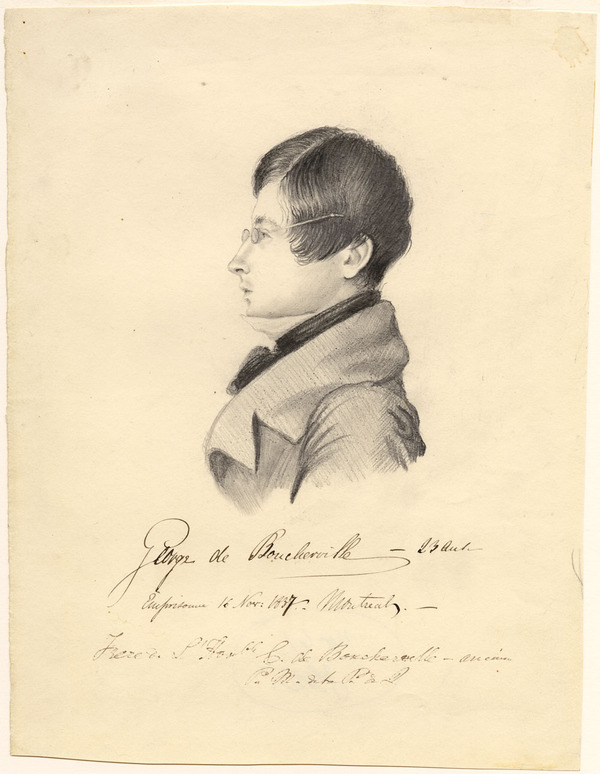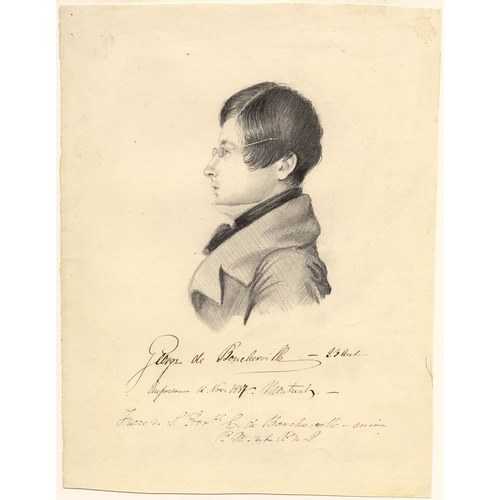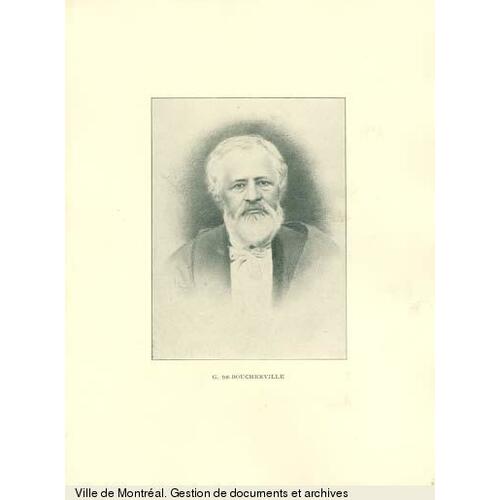BOUCHERVILLE, GEORGES DE (baptized Pierre-Georges-Prévost Boucher de Boucherville), author, lawyer, and office holder; b. 21 Oct. 1814 at Quebec, eldest son of Pierre de Boucherville and Marguerite-Émilie Bleury, and brother of Sir Charles-Eugène Boucher* de Boucherville; m. 15 Feb. 1847 Louise Gregory in Montreal, by Roman Catholic and Anglican rites, and they had two children; d. 6 Sept. 1894 in Saint-Laurent, Île d’Orléans, and was buried four days later in the family crypt at Boucherville, Que.
From 1822 to 1832 Georges de Boucherville studied at the Petit Séminaire de Montréal, where his inclination for mathematics, history, and English was developed. He was articled to Benjamin Beaubien in 1833 and subsequently to Alexander Buchanan*. At the same time he devoted himself to writing, and his first short story, “La tour de Trafalgar,” appeared on 2 May 1835 in L’Ami du peuple, de l’ordre et des lois. In September he also published here “Louise Chawinikisique,” a melodramatic tale influenced by Chateaubriand, for which he won first prize in a literary competition the paper sponsored.
Boucherville was called to the bar on 26 Jan. 1837. Interested in politics, he was a supporter of Louis-Joseph Papineau*, and for this reason his father prevented him from practising law in Montreal. Consequently he settled in Aylmer Township. He soon returned to Montreal, joined the Fils de la Liberté, and signed their manifesto in October 1837 as corresponding secretary [see André Ouimet*]. On 16 November he was arrested and charged with high treason, but his father secured his release and advised him to take refuge in the United States. Boucherville spent some time in New England; nothing is known of this period in his life except that he was involved with Robert Nelson*’s Association des Frères-Chasseurs. In July 1838 he was in Montreal, in legal practice with André Ouimet and busy defending prisoners accused of murder. Early in 1839 he went to Louisiana and the years he spent there are obscure.
Returning to Lower Canada in 1846, Boucherville went to practise law in Aylmer Township. From November 1848 to January 1849, he had several essays on economic subjects published under the pseudonym José in La Minerve, with the title, “Les sophismes de M. Bastiat.” He also wrote an adventure novel set in Louisiana, “Une de perdue, deux de trouvées,” which came out anonymously in serial form from January 1849 to June 1851 in the Album littéraire et musical de la Minerve and met with great success.
In 1856 Boucherville served on the commissions to revise the general statutes of Lower Canada and the statutes of the Province of Canada. His father, a legislative councillor since 1843, died in 1857 and he thereafter settled in Saint-Hyacinthe, where he brought out Projet d’étude pour la formation d’une banque agricole nationale pour le Bas-Canada in 1862 and Le credit foncier the following year. In 1864–65 La Revue canadienne issued a new serialized edition of “Une de perdue, deux de trouvées,” which Boucherville had changed by adding a sequel; it was not, however, well integrated with the first part. Its action is set in Lower Canada during the events of 1837; he defends the cause of the Patriotes, portraying them as having been forced to take up arms by the intransigence of the English party. According to literary critic Maurice Lemire, “This serial has the distinction of being almost the only one of our 19th-century novels to capture the reader’s interest.”
With the coming of confederation, Boucherville was appointed secretary to Lieutenant Governor Narcisse-Fortunat Belleau. Shortly afterwards he resigned to become clerk of the Legislative Council at Quebec, an office he retained until his retirement in 1889. Despite his responsibilities, Boucherville found time to make several trips to the United States and Latin America. In 1877 he published Le code du whist. He even undertook a second novel, “Nicolas Perrot ou les coureurs de bois sous la domination française,” which was serialized in La Revue de Québec in 1889. The twists and turns of its plot had made Boucherville’s first novel gripping, but in this one the hero triumphs over his enemies too easily, with the help of his inventions and a sort of deus ex machina.
Boucherville’s need for rationality was patent in his Dictionnaire de la langage des nombres . . . , which came out at Quebec in 1889. At that time there were dozens of different universal languages in the world, including Esperanto, but Boucherville’s had a distinct nature. “The basis of numerical language being numbers themselves, all operations that can be performed with numbers can also be performed with the words of the language,” he wrote. Furthermore, he claimed, the simplicity of the rules made the grammar easy to learn, the absence of roots meant that all ethnic references could be eliminated, and in addition, because of its arithmetical operations for textual reduction, it was economical for sending telegraphic messages.
Georges de Boucherville was criticized for the ambiguous nature of his political commitment, the apparent denial of his youthful convictions, and the opportunistic way in which, in “Une de perdue, deux de trouvées,” he had given the best roles in the story to the conservative élite of the 1860s in order to secure a comfortable position for himself. Yet he was concerned, it seems, with establishing a lasting understanding among Canadians. In any case, it is somewhat disturbing to see a man who was marked by the political turmoil of the 1830s and drew from it one of the most remarkable French Canadian literary works of the 19th century publish a purely rational method for achieving harmony among peoples, a language that was entirely without national connotations.
Georges de Boucherville’s novel Une de perdue, deux de trouvées was first published in book form in 1874, when it appeared in two volumes at Montreal; it has since gone through several editions, including one introduced by Réginald Hamel (Montréal, 1973). His stories “La tour de Trafalgar” and “Louise Chawinikisique” appeared in L’Ami du peuple, de l’ordre et des lois (Montréal) on 2 May and on 23 and 26 Sept. 1835. His essays on political economy, “Les sophismes de M. Bastiat,” were published in La Minerve between 9 Nov. 1848 and 11 Jan. 1849. He is also the author of Projet d’étude pour la formation d’une banque agricole nationale pour le Bas-Canada (Saint-Hyacinthe, Qué., 1862); Le crédit foncier (Québec, 1863); Le code du whist (Montréal, 1877); “Nicolas Perrot ou les coureurs de bois sous la domination française,” a serial which was published in La Rev. de Québec in 1889; and Dictionnaire du langage des nombres . . . (Québec, 1889).
ANQ-M, CE1-22, 3 oct. 1812, 10 sept. 1894. ANQ-Q, CE1-1, 24 oct. 1814. NA, MG 24, B93; MG 30, D1, 5: 362–70. L’Opinion publique, 22 févr. 1872. DOLQ, vol.1. Ægidius Fauteux, Patriotes de 1837–1838 (Montréal, 1950). Réginald Hamel et al., Dictionnaire pratique des auteurs québécois (Montréal, 1976). Le Jeune, Dictionnaire, vol.1. P.-G. Roy, Les avocats de la région de Québec. Turcotte, Le Conseil législatif. J.-S. Lesage, Notes biographiques; propos littéraires (Montréal, 1931). M.-A. Riopel, “Bibliographie de Georges Boucher de Boucherville, avocat” (thèse de bibliothéconomie, univ. de Montréal, 1945). J.-J. Lefebvre, “Brevets de cléricature des avocats de Montréal au deuxième quart de XIXe siècle,” La Rev. du Barreau (Montréal), 14 (1954): 310. É.-Z. Massicotte, “Deux fois mariés le même jour,” BRH, 27 (1921): 191–92.
Cite This Article
André Lemelin, “BOUCHERVILLE, GEORGES DE (baptized Pierre-Georges-Prévost Boucher de Boucherville),” in Dictionary of Canadian Biography, vol. 12, University of Toronto/Université Laval, 2003–, accessed January 2, 2026, https://www.biographi.ca/en/bio/boucherville_georges_de_12E.html.
The citation above shows the format for footnotes and endnotes according to the Chicago manual of style (16th edition). Information to be used in other citation formats:
| Permalink: | https://www.biographi.ca/en/bio/boucherville_georges_de_12E.html |
| Author of Article: | André Lemelin |
| Title of Article: | BOUCHERVILLE, GEORGES DE (baptized Pierre-Georges-Prévost Boucher de Boucherville) |
| Publication Name: | Dictionary of Canadian Biography, vol. 12 |
| Publisher: | University of Toronto/Université Laval |
| Year of publication: | 1990 |
| Year of revision: | 1990 |
| Access Date: | January 2, 2026 |





